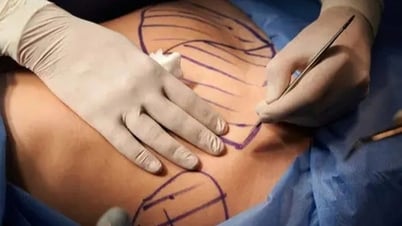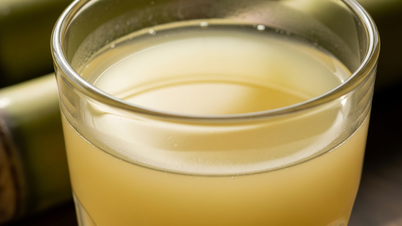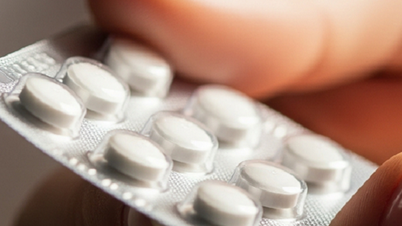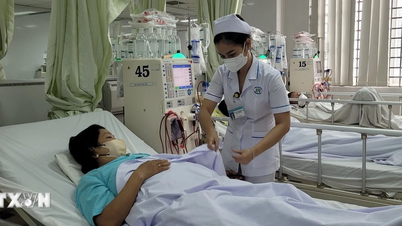During Tet, digestive problems such as bloating, stomach pain, irritable bowel syndrome, gastroesophageal reflux, food poisoning or gastrointestinal infections often occur.
Medical news January 27: How to prevent digestive diseases during Tet
During Tet, digestive problems such as bloating, stomach pain, irritable bowel syndrome, gastroesophageal reflux, food poisoning or gastrointestinal infections often occur.
How to prevent digestive diseases during Tet
The main causes of these problems are unbalanced nutrition, irregular meals, nutritional deficiencies, alcohol abuse and lack of sleep.
 |
| Eating well-cooked food and drinking boiled water is an important measure to help protect intestinal health during Tet. |
Unscientific eating habits such as eating too much protein, fat, and drinking alcohol without control can easily irritate the stomach, causing the digestive system to work too hard and causing illness. To help everyone have a happy and healthy Tet holiday and prevent digestive diseases, here is some advice from experts.
Green vegetables and fresh fruits are food groups that provide many vitamins, minerals and fiber, which are very beneficial for the digestive system and enhance immunity.
Deficiencies in these nutrients can directly affect the digestive process, increasing the risk of bloating, flatulence, and indigestion. To maintain the necessary amount of fiber during Tet, families can buy vegetables and tubers, wash them, let them dry, and store them in the refrigerator for later use. Eat vegetables and fruits alternately with starchy and meat-rich dishes to support better digestion.
Greasy foods such as banh chung, cold cuts, fried foods, etc. can easily cause bloating and indigestion. People should control the amount of these foods by eating only small amounts and combining them with green vegetables and fruits to reduce the impact on the stomach.
Doctor CKI Hoang Dinh Thanh, Endoscopy and Endoscopic Surgery Center, Tam Anh General Hospital, Ho Chi Minh City recommends that eating well-cooked food and drinking boiled water is an important measure to help protect intestinal health during Tet.
Dishes such as salads, rare meat, raw fish, raw oysters... contain many risks of bacterial and parasitic infections, which can cause digestive disorders and lead to dangerous complications. Therefore, make sure all foods are thoroughly cooked and drink boiled water to protect your health.
One of the common habits during Tet is to store food in the refrigerator and eat it again and again. However, pre-prepared foods have a short shelf life, only 1-3 days depending on the type of food.
If you eat expired food or food that is not stored properly, it can easily cause digestive disorders and food poisoning. Therefore, make sure that food is consumed within a short time and stored properly.
Alcohol not only irritates the intestinal mucosa but also increases the risk of bloating, indigestion and intestinal ulcers if consumed in excess. In addition, alcohol also greatly affects liver function, causing hepatitis and can lead to liver failure if used for a long time.
During the Tet holiday, men should not drink more than 14 units of alcohol per week and no more than three units per day, while women should not exceed two units of alcohol per day. One unit of alcohol is equivalent to 270ml of beer, 125ml of wine, or 25ml of spirits.
Daily routines during Tet are often disrupted, such as staying up late, waking up early, eating late at night, etc. This can easily disrupt the digestive system, leading to symptoms such as diarrhea, constipation, food poisoning, and gastrointestinal infections.
Dr. Thanh said that to prevent digestive diseases, people need to control the frequency of eating and ensure food hygiene in each meal. There is no need to set strict nutritional regulations, but it is necessary to pay attention to eating moderately and reasonably.
Limit alcohol consumption and smoking to maintain a healthy digestive system during the Tet holiday.
Balancing your sleep rhythm during Tet
During Tet, daily routines often change, leading to disruptions in the body's biological rhythms, especially sleep. Therefore, maintaining quality sleep during Tet is very important to maintain health and energy.
Accordingly, even if you do not have to go to work or school during Tet, everyone should try to keep a sleep schedule similar to normal days. Waking up and going to bed at fixed times will help the body maintain its natural biological rhythm, making sleep easier and minimizing health problems caused by lack of sleep.
One of the common habits during Tet is taking a long nap, especially after eating a big meal. Napping for too long (more than 1-2 hours) can disrupt your sleep at night. If you feel the need to rest, you should only take a short nap so as not to affect your sleep at night, helping your body to easily fall into a deep sleep at night.
Caffeine and alcohol are both drinks that can disrupt sleep. Caffeine is a stimulant that can make it difficult to fall asleep, while alcohol, although it can help you feel sleepy quickly, will cause you to sleep poorly and wake up easily in the middle of the night. Everyone should not drink caffeine or alcohol within 4-6 hours before going to bed to ensure that your sleep is not interrupted.
To get a good night’s sleep, you need to make sure your bedroom is quiet, dark, and cool. Limit noise and light from phones and other electronic devices, as these can disrupt your sleep. A comfortable sleeping space will help you relax and fall asleep more easily.
Gentle exercise such as walking, yoga or relaxation exercises can help the body relieve stress and fatigue, thereby helping you sleep more easily at night. Maintaining a regular exercise routine during Tet is also very important, helping to improve sleep quality and maintain good health.
Electronic devices such as phones, computers, or TVs emit blue light that can disrupt the production of melatonin, the hormone that helps you feel sleepy. Therefore, you should not use these devices at least 30 minutes before going to bed. This will help the sleeping process more smoothly, giving you a deeper and better quality sleep.
During Tet parties, people often have the habit of eating and drinking freely, but people should not eat too much before going to bed. Eating too much can cause difficulty sleeping or lead to gastric reflux, disrupting sleep. If you feel hungry in the evening, you can eat light and easily digestible meals so as not to affect your sleep.
Tet is a time for family gatherings, but it can also be stressful, especially if you have a lot of activities to prepare for. Dr. Hang recommends practicing relaxation techniques such as meditation or deep breathing to reduce anxiety. This will help your body relax, making it easier to fall asleep and helping you have a truly relaxing Tet holiday.
Preventing alcohol-induced stroke during Tet
Tet is a time when many people easily overstep their dietary restrictions, especially when it comes to alcohol consumption. However, the negative effects of alcohol on the cardiovascular and central nervous systems can cause serious problems, including stroke.
Studies show that the risk of stroke is highest within one to two hours of drinking alcohol, mainly due to sudden increases in blood pressure and heart rhythm disturbances.
Drinking alcohol, especially over a short period of time, can cause a sudden and persistent increase in blood pressure. This is a major risk factor for both ischemic and hemorrhagic stroke.
In addition, alcohol reduces the elasticity of the vessel walls, damages the endothelium, and promotes atherosclerosis. When plaques grow or rupture, they can impede blood flow, causing blockages and increasing the risk of blood clots. These clots can travel to the brain, causing a stroke.
Short-term drinking can also lead to a condition called “Heart Holiday Syndrome” (HHS), a common condition among people who drink heavily during the holidays. This can cause atrial fibrillation, a type of irregular heartbeat that increases the risk of blood clots forming in the atria, which can lead to stroke.
Long-term alcohol consumption also affects platelet function and the coagulation system, increasing the risk of bleeding. Therefore, the harmful effects of alcohol not only exist in the first hours after drinking, but can also accumulate over time and seriously affect cardiovascular and neurological health.
In addition to the effects of alcohol on the body, individual factors also play an important role in stroke risk. Older adults are less able to metabolize alcohol, which increases the adverse effects on blood pressure and liver function.
Women are also at higher risk than men because they have lower body water content, which can lead to higher blood alcohol levels when drinking the same amount of alcohol. People with diabetes, lipid disorders or high blood pressure are also more susceptible to the adverse effects of alcohol, which can increase the risk of stroke.
Previously, some studies have suggested that drinking alcohol in small doses (such as a glass of wine a day) may benefit heart health, largely due to its ability to increase HDL cholesterol (the good cholesterol).
However, these benefits are not uniform across the board and are not enough to protect against stroke. A recent study found that even low levels of alcohol consumption may increase the risk of stroke, especially in people with existing risk factors such as high blood pressure, dyslipidemia, atrial fibrillation or diabetes. Therefore, alcohol consumption should be carefully controlled, even if it is only consumed in small amounts.
To reduce the risk of stroke during Tet, one of the most effective measures is to limit or not use alcohol. If you cannot refuse alcohol, pay attention to the following notes to protect your health:
Limit alcohol intake: Men should have no more than 2 units of alcohol per day, and women should have no more than 1 unit of alcohol. One unit of alcohol is equivalent to a 330ml can of beer or a 100ml glass of wine.
Do not drink alcohol on an empty stomach: Drinking alcohol on an empty stomach can rapidly increase blood alcohol concentration, cause heart rhythm disturbances and increase the risk of stroke.
Drink enough water: Alcohol causes dehydration, leading to a lack of oxygen in the brain and increasing the risk of stroke. Alternate drinking water with alcohol and drink plenty of water before and after drinking alcohol to minimize the harm.
Do not combine alcohol with other stimulants: Avoid drinking alcohol with coffee, energy drinks or carbonated drinks because these substances can increase the effects of alcohol on the body and harm your health.
Avoid exposure to cold and drafts: After drinking alcohol, avoid going out in cold, windy places because this can cause blood vessels to suddenly constrict and increase blood pressure, leading to the risk of stroke.
Tet is a time of joy and family reunion, but it is also a time when we can easily neglect our health, especially when it comes to alcohol consumption. Maintaining healthy eating habits and controlling your alcohol consumption will help reduce the risk of stroke and protect your health during Tet holiday.
Source: https://baodautu.vn/tin-moi-y-te-ngay-271-cach-phong-ngua-cac-benh-tieu-hoa-ngay-tet-d243262.html

























































































![[OCOP REVIEW] Tu Duyen Syrup - The essence of herbs from the mountains and forests of Nhu Thanh](https://vphoto.vietnam.vn/thumb/402x226/vietnam/resource/IMAGE/2025/6/5/58ca32fce4ec44039e444fbfae7e75ec)







Comment (0)